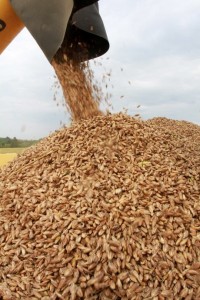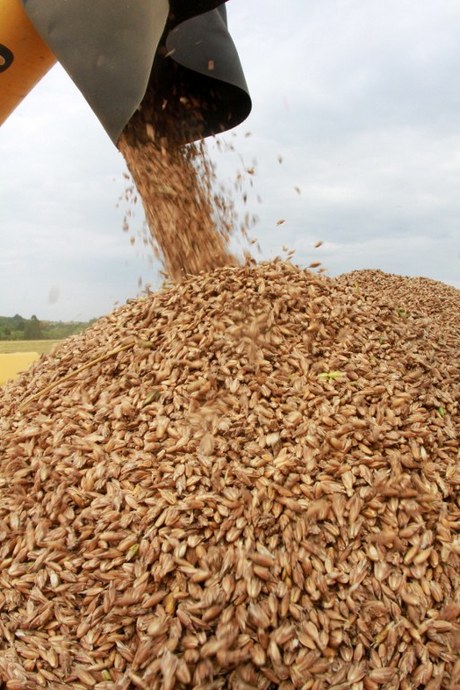
(AFP Photo/Petras Malukas)
The average ratio of Egypt’s wheat self-sufficiency reached 54.9% between 2002/2003 and 2012/2013, according to a Central Agency for Public Mobilization and Statistics (CAPMAS) study entitled “self-sufficiency of wheat in Egypt”.
The study added that the self-sufficiency average of wheat in 2012/2013 reached 56.7%, marking a gap in wheat production and consumption of approximately 7.2m tonnes over the same year.
The study also showed the wheat self-sufficiency percentage can be increased to 66.9% in case of removing part of the area cultivated with sustainable clover to cultivate wheat.
The area cultivated with wheat has increased by 34.8% over 2012/2013 compared to the area that was cultivated in 2002/2003, according to CAPMAS.
It added that the governorates of Sharqeya, Beheira and Daqahleya are the most prominent wheat cultivators, with their total cultivated area at 1.1m acres. This represents 32% of the total area cultivated with wheat across the country.
During 2012/2013, wheat production reached 9.5m tonnes, whereas imports of the grain recorded 6.8m tonnes, and consumption reached 16.7m tonnes, the study said.
CAPMAS also noted that the average consumption per person has risen from 181.7kg in 2002/2003 to 229.9kg in 2009/2010, while it declined to 202kg in 2012/2013.
The study elaborated that the quantity of wheat imports increased from 5.2m tonnes in 2002/2003 to 9.8m tonnes in 2009/2010, while it has decreased to 6.8m tonnes in 2012/2013.
Meanwhile, the wheat subsidy value reached EGP 21.2bn in 2012/2013, representing 12.4% of total subsidy and about 61.1% of food commodities subsidy, the study said.
The wheat supply price increased by 160.7% to reach EGP 2,630 per tonne in 2012/2013, compared to EGP 1,010 per tonne in 2003/2004, according to the study. It noted that this increase encourages farmers to cultivate wheat.
Furthermore, during 2014/2015, the Ministry of Supply succeeded in reducing the amount of imported wheat to 4.6m tonnes, compared to 6.4m tonnes last year, according to Minister of Supply Khaled Hanafy in early June.
Egypt is the largest importer of wheat in the world due to insufficient domestic production, which stood at 3.7m tonnes in 2014, according to Hanafy. He added that the production increased this year, as the ministry received 5m tonnes of wheat from farmers in various governorates.




